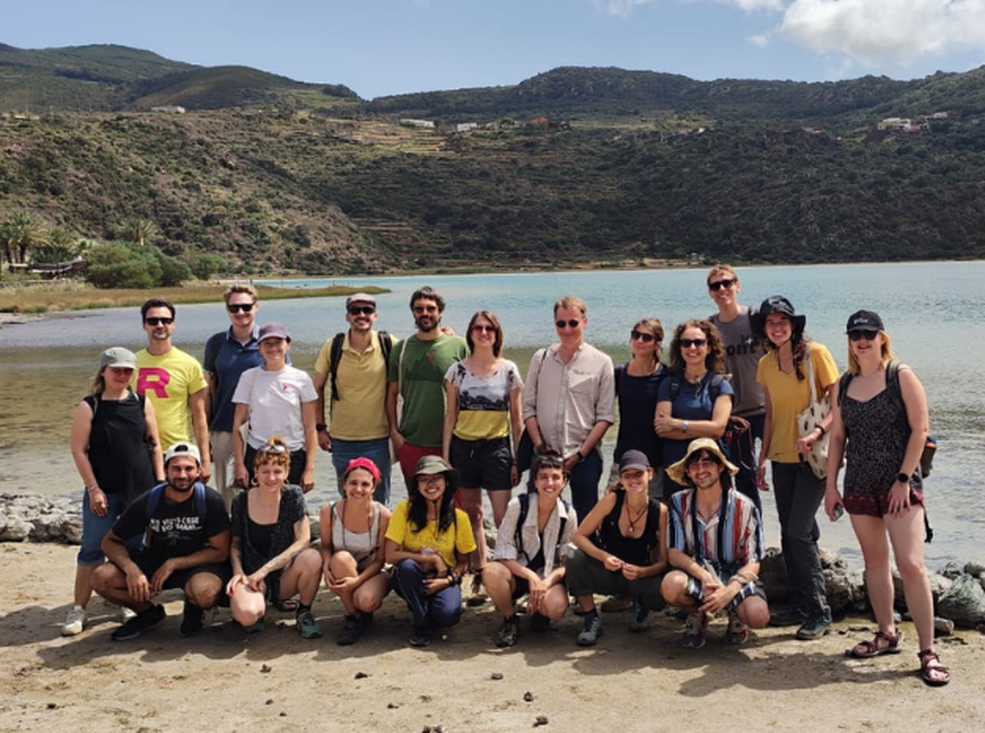IPHES-CERCA is organising a summer school on the island of Pantelleria (Sicily) about the human-plant relationships in small islands
The summer school, organised by Claudia Speciale (postdoctoral researcher MSCA-COFUND R2STAIR), includes theoretical sessions by various specialists, as well as visits to different spaces and sites, and practical activities in experimental archaeology
The summer course "An Island Archaeobotany", organised by IPHES-CERCA, the Isola di Pantelleria Parco Nazionale and the University of Bologna, on the island of Pantelleria (Sicily), has been running since Sunday 23rd June. The course, which will end on Sunday 29th June, will be attended by a dozen students of different nationalities and academic backgrounds, selected from more than seventy applications, who will receive specific training related to the study of the relationship between humans and plants on small islands.
The course programme includes theoretical sessions by various specialists, as well as visits to different locations and sites, and practical activities in experimental archaeology, with the aim of providing students with very specific training in archaeobotany, ecology, zooarchaeology, island archaeology, sedimentary DNA, the study of stable isotopes, etc. At the end of the course, students will develop and present a project linked to the different knowledge acquired during the course.
Among the course lecturers are Nit Cano Cano (URV FI-AGAUR PhD student) who will talk about starches, Dr. Ethel Allué (IPHES-CERCA researcher and lecturer at the URV) who will talk about anthracological studies in tropical contexts and Dr. Céline Kerfant (researcher at the UPF and associated with IPHES-CERCA) who will talk about phytoliths and ethnobotany in island contexts. Lecturers from other institutions will also take part and will give lectures or practical classes on different topics (see programme). These include Dr. Mònica Aguilera and Dr. Jordi Voltas (University of Lleida) who will talk about stable isotopes and dendroecology, Dr. Sandra Nogues (CREAF UAB) who will talk about island palaeoecology and Drs. Llorenç Picornell-Gelabert and Gabriel Servera (UIB) who will talk about palynology and anthracology in the Balearic Islands. Also participating will be professors from international centres such as Dr. Helen Dawson, University of Tubingen (Germany) who will talk about island archaeology; Dr. Florencia Debandi, University of Alma Mater Bologna (Italy) who will talk about food and diet in the Bronze Age or Dr. Alessandro Peinetti (INRAP-France) who will talk about soil micromorphology.
The islands, a very important source of ecological information
The islands are ecosystems that serve as laboratories for research in different fields. Specifically, through archaeobotany, the islands allow us to understand aspects of the exploitation of plant resources, the occupation of humans and the transformations and impact of humans on the environment.
Since 2023, IPHES-CERCA has been developing the research project "SIciLian small islands VegetAtion under the effect of the first human colonizers (SILVA)", led by Dr. Claudia Speciale, researcher MSCA-COFUND-R2STAIR 2020 and supervised by Dr. Ethel Allué, with the aim of studying how the human communities of the past interacted with their environment, from the perspective provided by archaeobotany and the study of carbon 13 isotopes, which allow us to obtain data on temperatures and rainfall in the past. Within the framework of the SILVA project, Dr. Speciale is carrying out research on the small islands around the Mediterranean: Ustica, Lipari, Filicudi, Lampedusa and Pantelleria.
Funding
The summer school has been funded by the MSCA-COFUND R2STAIR SILVA project led by Dr. Claudia Speciale, the GAPS SGR2021-1237 research group, the "María de Maeztu" programme for Units of Excellence in R&D (CEX2019-000945-M), the Università Populare de Pantelleria and Arqueolabio.

